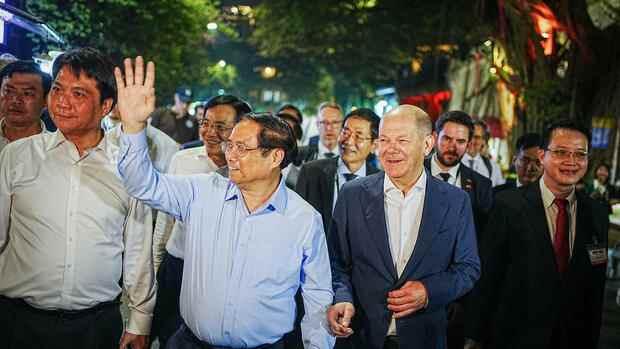Federal Chancellor Olaf Scholz (SPD) and Pham Minh Chinh (l), Prime Minister of the Socialist Republic of Vietnam, stroll through Hanoi in the evening.
(Photo: dpa)
Olaf Scholz and Robert Habeck are two traveling salesmen on the same mission. Chancellor and Vice-Chancellor went on a big promotional tour in Asia on Monday to deepen economic relations in the ASEAN region. But to be honest, it was about a completely different goal in the first place: reducing dependence on China.
The German offensive in the Indo-Pacific is late, but at least it is coming. If Germany wants to free itself from its dependence on China, it has to make more efforts to help its neighbors. Germany’s rethinking of trade policy is also reflected in the way the trips were flanked politically. The traffic light’s new trade agenda puts an end to Germany’s anti-globalisation posturing and is finally backing up new free trade agreements.
The fact that Economics Minister Habeck is simultaneously applying country caps when granting state export credits for German companies should reduce the “cluster risk in China”. And at the same time it is a signal: Politicians can tighten the thumbscrews for industry even more if they continue to surrender themselves to China.
But Scholz’s trip to Asia also brought disillusionment. The chancellor was unable to conclude agreements with substance. The idea that the rest of Asia could replace even part of Germany’s business with China in the foreseeable future is naïve. For example, Germany’s trade volume with Vietnam is just five percent of the volume with China.
Top jobs of the day
Find the best jobs now and
be notified by email.
Diversification takes time, but Germany has to hurry: The USA has long since started to weaken China technologically through targeted sanctions. Sooner or later the German economy threatens to be drawn into this conflict.
More: How closed is China really to foreign investors?
